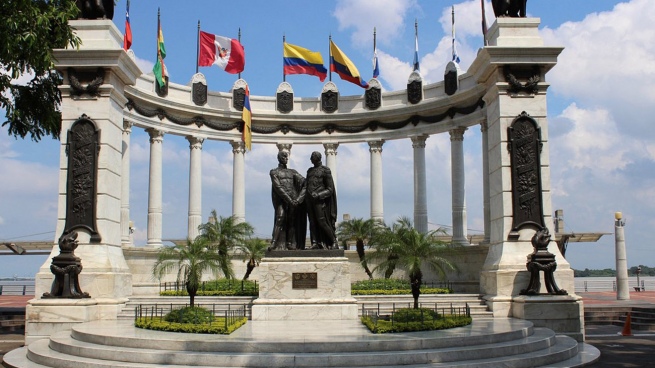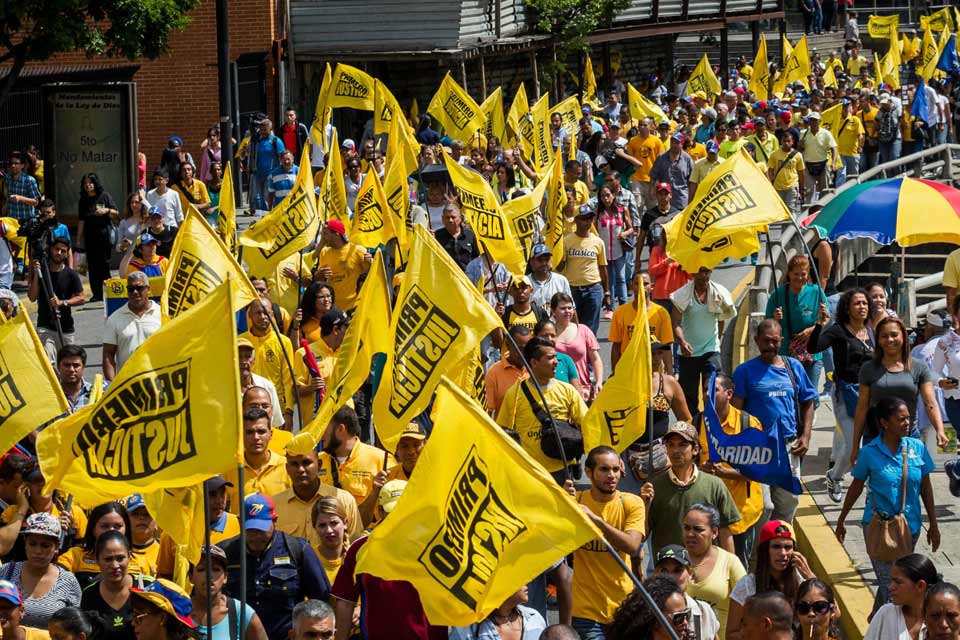In the exact middle between north and south, on the equatorial line that divides the planet into equal parts, the solar equinox occurs where José de San Martín and Simón Bolívar merged in a fraternal embrace. The meeting was two hundred years ago and today is amazing.
It was in the heroic Guayaquil where the Liberators of America arrived exhausted, after years of fighting and bloody battles. Who else has such a title?
While one came from liberating the territories that today are called Venezuela, Colombia and Ecuador, the other came from doing the same with Argentina, Chile and Peru. Days before the historic meeting that we remember today, San Martín had sent a
division under the command of Colonel Andrés Santa Cruz, to assist the troops of General Antonio de Sucre who finally gave us victory in the battles of Riobamba and Pichincha.
About that event, historian Jorge Abelardo Ramos points out, those who later became Argentines, Peruvians, Bolivians, Quito, Colombians, Venezuelans, Haitians, Chileans, Uruguayans and Paraguayans mixed their blood.
The Liberators had already been communicating and announcing this meeting requested by General San Martín, to which General Bolívar responded immediately: “I had wanted that moment all my life and only to embrace Your Excellency, and to gather our flags, may be more satisfactory to me, Your Excellency kindly accepts the most frank testimonies of my deep consideration and respect for Your Excellency, attentive, devoted servant.”
After which San Martín announces in Lima: “The cause of the American Continent leads me to carry out a plan that flatters my dearest hopes. I am going to meet the Liberator of Colombia in Guayaquil.
The general interests of Peru and Colombia, the energetic termination of the war, and the stability of the destiny that America is rapidly approaching make our meeting necessary, since the order of events has made us largely responsible for the success of this sublime enterprise”. And he writes to Bolívar: “Defenders of the same country, dedicated to the same cause and uniform in our sentiments for the freedom of the new world.
It belongs to Your Excellency, the congratulations of the soldiers of the Republic of Colombia are used against the power and tyranny of Spain in any part of the continent in which the children of America are afflicted.” And Simón Bolívar replies: “My first thought in the Carabobo countryside, when I saw my free homeland, was Your Excellency, Peru and its liberating army.
Contemplating that no obstacle now stood in the way of my flying to extend my arms to the Liberator of South America, joy filled my feelings, Your Excellency, you must believe me: after the good of Colombia, nothing occupies me as much as the success of arms Your Excellency, so worthy to carry their glorious banners wherever there are slaves who shelter their shadow… And San Martín points out: “It is necessary to greatly combine the interests that the peoples have entrusted to us, for a solid and stable prosperity, let them know the benefit of independence… My soul is filled with joy when I contemplate that moment.
We will see each other, and I have a feeling that America will not forget the day we hug each other.” Finally, on July 26 and 27, 1822, they met in the city of Guayaquil where they talked for hours without witnesses. Historians debate to this day what the Liberators said to each other. What were the points addressed? What were your coincidences and disagreements?
A few days later, San Martín sent him a letter where he pointed out: “For me it would have been the height of happiness to end the war of independence under the orders of a general to whom America owes its freedom. Fate disposes otherwise and it is necessary to conform… I am sending you a shotgun and a couple of pistols together with the Paso horse that I offered you in Guayaquil. You admit, General, this memory of the first of your admirers. With these sentiments and with those of wishing you only be the one who has the glory of ending the war of independence of South America, your most affectionate servant repeats himself”.
The betrayal would arrive early on San Martin. The port oligarchies of Buenos Aires and Lima cut off supplies
and all support for the liberating campaign. And they unleashed a smear campaign that incited him from the media of the time. While they were debating in Guayaquil, the same betrayal against Bolívar was being prepared in Bogotá and Caracas. General Gervasio Artigas had already been defeated in the Banda Oriental.
The meeting in Guayaquil was between two companions for the same cause. Warriors and statesmen. Both were compared to great characters of humanity such as Hannibal, Napoleon and Julius Caesar.9 We can point out in this regard that the epics of San Martin and Bolívar were in processes of national independence. While the aforementioned were heads of imperialist nations.
The topics that were treated in secret were none other than those concerning the definitive American liberation and the formulas of government that could be given to the new republics. Issues still pending for his heirs. We Latin Americans soon owe ourselves a Second Meeting in Guayaquil.
Aware that the same enemies of Bolívar and San Martín are as valid as they were 200 years ago, We must work together with our peoples in the ideals of the unity of the great Latin American nation. Today CELAC, Mercosur, Parlasur and the various political, social, cultural and economic integration organizations must be strengthened and not give up until they see the Great Homeland united, without borders.
We are convinced that only unity will make us eternally free. We highlight the words of Pope Francis who decisively points out: “We have a Homeland that, in its desires and longing for brotherhood, projects itself beyond the limits of the country: towards the Great Homeland, the one that San Martín and Bolívar dreamed of. This reality unites us in a family of broad horizons and sibling loyalty.”
About the authors
*Adolfo Rodríguez Saá (National Senator – Chairman of the Committee on Foreign Affairs and Worship).
*Eduardo Valdes (National Deputy – Chairman of the Committee on Foreign Affairs and Worship).
*Gabriel Fuks (Ambassador to the Republic of Ecuador).









